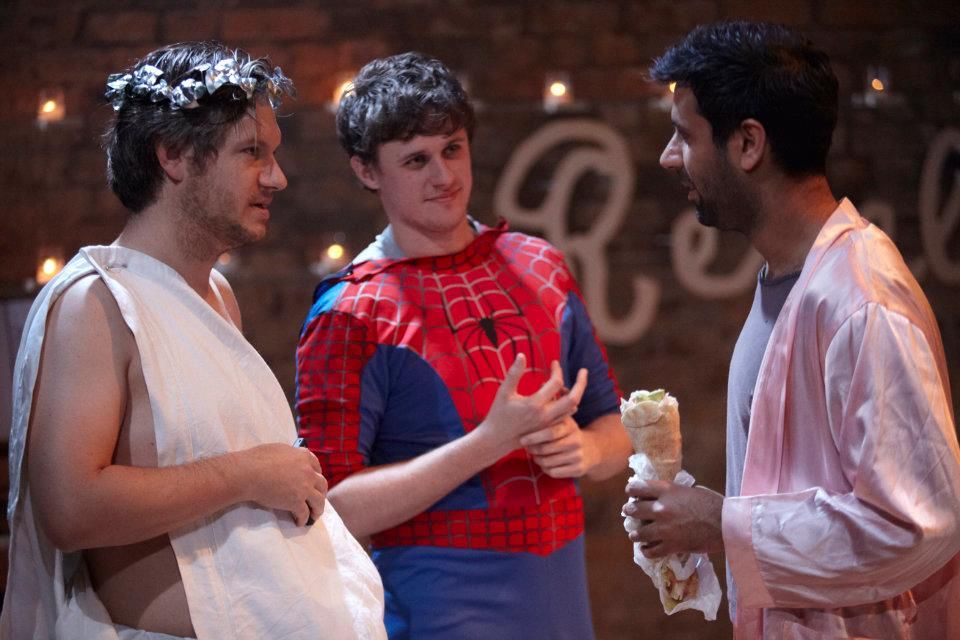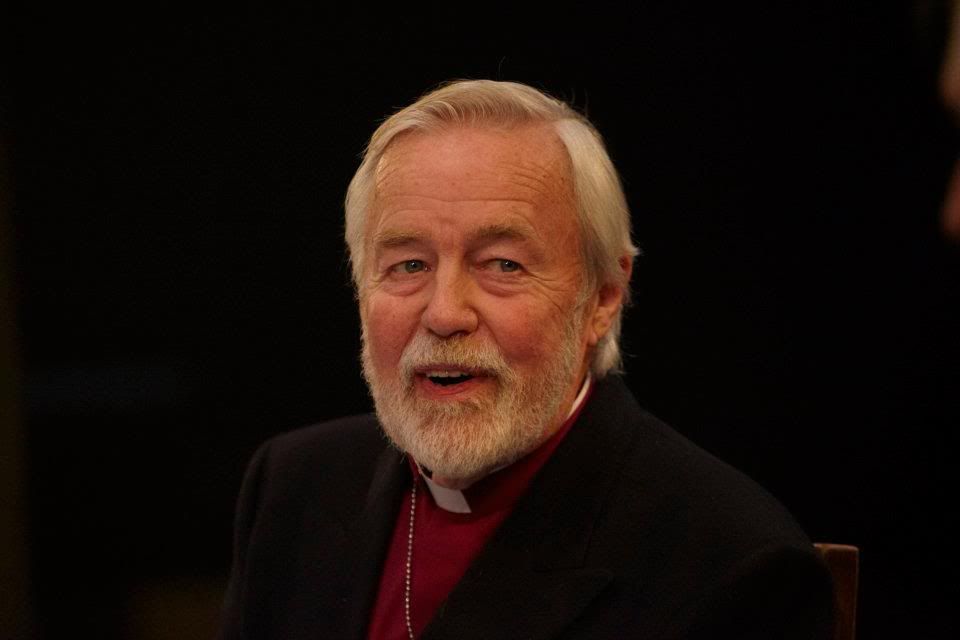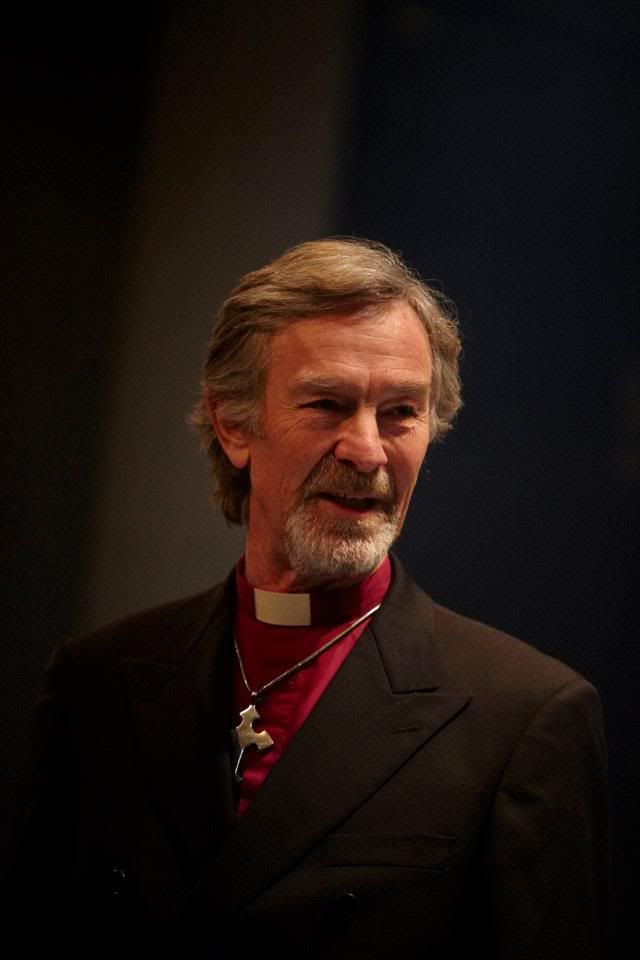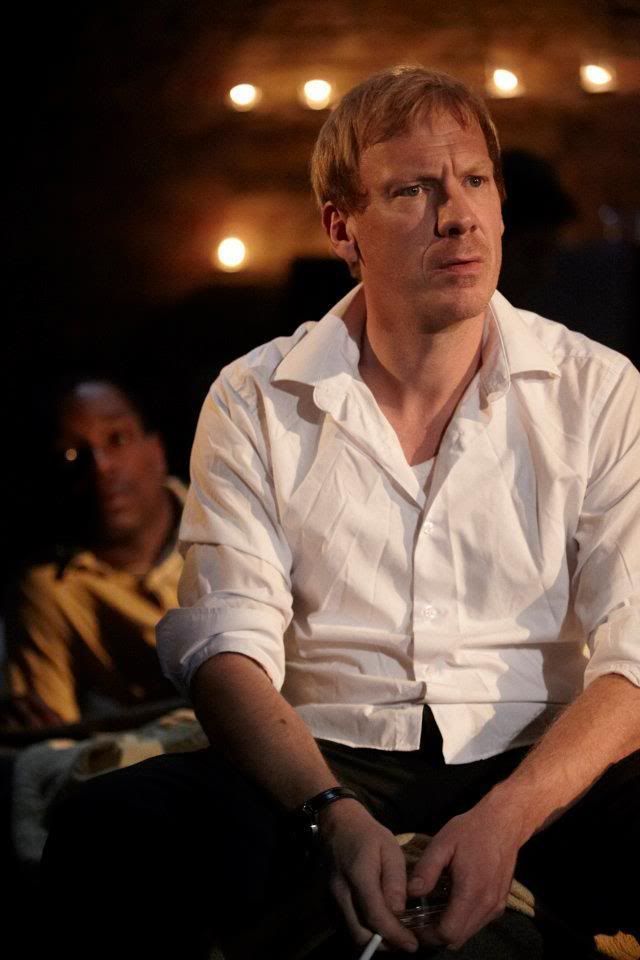A vague attempt to keep a diary of my theatre going for a year - not-quite-reviews, scribblings, enthusiasm and odd diversions (WARNING: spoilers abound).
Saturday, 15 October 2011
66 Books - Bush Theatre - Part 7 (1 Thessalonians to Hebrews / 1.10pm to 4.45pm)
52. Paul’s First Voicemail to Thessa by DC Jackson (1 Thessalonians) *
“PAUL: I know that we’re so far apart, geographically, and I know that it isn’t ideal. I mean, I know that it’s shit, it’s shit to be apart isn’t it? But you know that I’m always thinking about you. Always. And if you’re always thinking about me then that means we’ll be okay. You are always thinking about me aren’t you? Always? Because baby you know that I’m a good man and I behave in a good way. You know that I’m not running around cheating on you or anything like that and you know I never would. And I know that sometimes you think I’m being a bit controlling or whatever but it’s only because I care about you so much baby and I just want the very best for you.”
Another piece where I’m massively pleased that the director, Michael Longhurst, decided to ignore Jackson’s stage directions (I’m starting to think that it’s a bad idea to make directions too specific), as in this case it called for the performance to either be recorded or to take place off stage. As I’d found both approaches difficult earlier in the 66 Books, I was glad that instead they went for a familiar drunken student scene complete with fancy dress (overly familiar really as I have drunken students galore in my job). I felt the visual humour contributed to rather than detracted from the play. It was great fun to watch and fantastically captured the drunken dynamics of the group, plus I thought the play itself cleverly and commedically brought out some of the concerns of the early church - the lack of control, fear of betrayal, and jealousy amongst them.
53. Falling Away by Christopher Shinn (2 Thessalonians)
“TOM: You haven’t said a word about him. The relationship is not working, clearly. You’re throwing your life away. I’m right here. We’re in love with each other.
[Pause]
ANNA: I did want to see you. I think you - knew the parameters.
TOM: I know what you must still be telling yourself they are. But I can’t believe that’s all you truly want. To have some desiccated friendship when we both feel the passion we do.”
This was a very interesting piece and delicately handled by both Indira Varma and Mark Bonnar. An exploration of relationships that don’t quite start and relationships that you can’t quite end. It spoke to me of being needed, of faith and of acceptance even knowing that their are still dark times ahead. An effective metaphor for Christianity in many ways.
54. Concerning Faith by David Edgar (1 Timothy)
“LATIMER: We speak notwithstanding of a man who will likely be less known to you.
[Parker opens the book.]
PARKER: Master Thomas Bilney.
TUNSTALL: Little Bilney.
LATIMER: Or rather as I knew, loved and thought him, no lesser than Saint Bilney. [Pause.] Slight in stature, slender of body, taking commonly but one meal a day, giving the remains to those in prison sleeping but four hours a night, abiding no swearing nor singing.”
Focusing on three Tudor reverands discussion of Thomas Bilney, this was an interesting turn up for me as I’ve been reading about Bilney myself recently and, Matthew Parker, one of the characters comes up fairly often in my reading on Christopher Marlowe. In some ways this familiarity gave it less impact for me personally, I knew a lot of what it was telling me. But I did think that Christopher Ravenscroft, Patrick Drury and William Gaunt did a fantastic job, exploring the characters own guilt and sense of failure and the questioning of their own morals. Plus I thought the ending, highlighting the different messages Bilney could have taken from 1 Timothy was very effective.
55. Hand-Me-Downs / Timothy the Second (2 Timothy)
“It would be nice, wouldn’t it, it would be nice to still open a letter, to sit down with a cup of tear, or a gin (more likely), nice G&T, to sit and hold it, a letter, in your hand. Because it has come from their hand, hasn’t it, that’s the point, that’s why you feel a connection. They wrote on that bit of paper, in their handwriting.
Saying that, all of Anthony’s letters to me, they got ruined in the loft cause of the damp we had the other year. All his... well, yes, call a spade a spade, ‘love’; they were love letters; God, sounds so old-fashioned now. They’re all gone, which is such...
God, I was inconsolable. Unconsolable? Inconsolable?
Gone forever, though.
So maybe emails are better, ey: not much chance of damp getting into the internet is there?”
There was a lot I liked about this piece and it resonated with me deeply in several ways - the discussion of depression, for example, rang very true, as did Pauline’s need to throw herself in to something, to deal with her loss. The thought that struck me most deeply, though, was the quote above. It reminded me of handling a 6th century BC clay pot at university and finding a thumb print in the clay, that mine fit perfectly - a physical connection between me and somebody from millenia past, it was an incredible moment. I love those moments when plays connect so deeply and personally. And although I found the swapping of the clothes amongst the audience a little distracting and laboured, I think overall the piece worked well.
BREAK
56. Titus Sermon / A Sunday Sermon by Anya Reiss (Titus)
“No sorry, sorry Mr Kenny there’s no need for you to leave, there’s no need for you to leave, do please, sit back down. Please... thank you.
You misunderstood my point. I forgive you, but quoting that rather excellent graffiti that I saw at Nicholas’ home a few days ago ‘will God forgive you?’ No sorry Mr Kenny, Mr Kenny oh and Mr Edes you mustn’t leave as well, Mr... [They have left.]”
With just ten books to go the melancholy that had started to seep in to the responses, became bleaker and themes like the difficulty of forgiveness and the loss of hope and faith became more prevalent. A Sunday Sermon (there is some discrepancy between the title in the printed playtext and the programme), a breakdown via pulpit, looks very specifically at forgiveness - and at the idea of how he who is without sin casts the first stone works today. The point is very clearly made that none of us now are without sin in the biblical sense, but it is also not made clear what crime Nicholas, the condemned priest, has committed. A sense lingers that even if no one is left fit to judge, judgement still is necessary. It’s an interesting debate, but I’m not sure that the response itself entirely works - both the pulpit (I clearly have issues with them) and the fact that we, representing the congregations, are rather harangued had a distancing effect, that shut down debate on the subject rather than promoting it.
57. The Letter by Kamila Shamsie (Philemon) *
“I run because I am a man with limbs and muscles and strength, and forward is a direction open to me. I run to leave behind all that is behind.
He won’t understand that. He sees running as a state of terror, of exhaustion, of un-belonging. He said that word to me once - ‘belonging’ - as if it was an apple you could bite into. He listed everything to which he thinks he belongs - his people, his country, his party, his revolution. From where I stand, it’s clear he belongs to the prison guards.”
I’ve been something of a fan of Prasanna Puwanarajah since watching him play both Fabian and Antonio (sometimes in the same scene) during an understudy run of Twelfth Night at the RSC and thought he was again very good here - he always finds an excellent balance between intelligence and emotion in his performances. Here he also benefited from an excellent script by Kamila Shamshie, exploring the cost that can come with freedom and privelege, full of wonderful imagery – it twisted and gave new life to a Book that is in many ways a very brief oddity.
58. The Middle Man by Anthony Weigh (Hebrews)
“TIMOTHY: We were both pretty drunk by now.
Very drunk.
His room was small and spinning and in an ugly little wing of pebble-crete off the back of an old church known locally as ‘the abbey’. Never looked much like an abbey to me. But then, what do I know about abbeys?
There was a sink in the room and a little cupboard with an electric shower inside.
He sat on the bed and smoked with the window closed.”
I find myself slightly lost what to say about this one, exploring an awakening gay experience for a closeted married man on the brink of committing suicide, there is a slightly haunting beauty to it. But it is also quite unreal, half dream, Timothy at the end goes back to his life and his wife, passing it off as a sin forgivable because it happened when he was ‘dead’. Though I still liked the piece, I felt somewhat abandoned at the end, with my emotions still suspended - far deeper and cleverer than ‘he woke up and it was all a dream’, but kept the conceit and, therefore, a sense of incompleteness.
BREAK
Part 8
Labels:
66 books,
bush theatre
Subscribe to:
Post Comments (Atom)





No comments:
Post a Comment